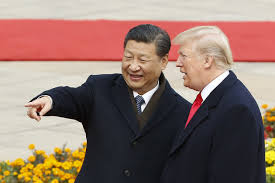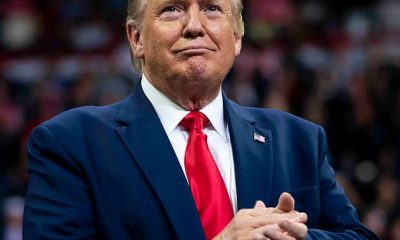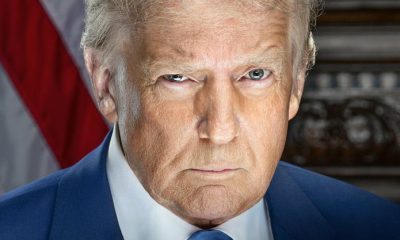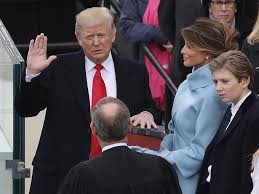Editorial Opinion
Voting for a better US political system
Published
9 years agoon
By
Olu Emmanuel
By JEFFREY FRANKEL
THE American political train has gone off the rails, and it seems farther than ever from getting back on track. There has been a lot of finger pointing, with commentators blaming issues like gerrymandering, rising economic inequality, the campaign finance system, and unbalanced journalism. But the public cannot address these genuine flaws in the system directly. What they can do is tackle another fundamental problem: low voter turnout.
The beauty of democracy is that, if people vote, they can effect change. It may not happen as quickly as they would like, and the candidates may not always be ideal. But voters can still help shape their country’s future.
Nowadays, many are politically disillusioned. With the rich and powerful pulling the strings, ordinary people feel that they have no influence on electoral outcomes. So, they conclude, they might as well not register or show up to vote. This behavior is most prominent among young people and some ethnic groups, particularly Latinos and Asian-Americans.
To be sure, complaints about US politics are not unfounded. Income inequality is on the rise, with the top 1% holding a vastly disproportionate amount of wealth, while middle- and lower-class incomes remain largely stagnant. And there is too much money in politics, exemplified by the influence of interest groups like the National Rifle Association.
It is worth noting that in US politics, the money overwhelmingly goes into advertising and other campaign activities, not the pockets of corrupt officials. But there is still an urgent need to address the outsize role of large donors. The Supreme Court’s 2010 decision in Citizens United, which opened the floodgates for political contributions by corporations, should be reversed. And concerted steps must be taken to achieve greater income equality.
But there is a way for the public to address both inequality and campaign finance: vote.
A citizen who stays home, rather than voting for the candidate he or she prefers, is merely reinforcing the impact of the fat cat who donates to the opposing candidate’s campaign. If people want any say over their country’s direction, they must do their part to elect the most appropriate candidate.
As usual, in November’s US presidential election, it is the Democratic candidate, Hillary Clinton, whose platform includes policies that will promote greater economic equality, including a more progressive tax system, higher wages, and universal health insurance. With enough support in Congress, Clinton would enact these policies. The Republic candidate, Donald Trump, favors the opposite policies: cutting taxes for the rich, keeping wages low, and rolling back health-care reforms.
ALSO SEE: Trump not qualified to be president – Obama
Likewise, the Democrats want Citizens United reversed, whereas the Republicans want it upheld. Because the next US president will have the opportunity to appoint at least one Supreme Court justice (and potentially up to four), a vote for Clinton may well be a vote for overturning a decision that has contributed to voter disillusionment. While that outcome is not guaranteed, one thing is: an angry blog post about how the system is rigged, or a vote for a third-party candidate with no chance of winning, will have no effect or worse.
In fact, a “protest” vote for an impossible third-party candidate can produce an outcome that is much farther from one’s own values than a vote for a candidate who has a platform more closely resembling that of the “ideal” choice. In 2000, the 2.9 million votes that were cast for the Green Party’s candidate, Ralph Nader, cost Democratic candidate Al Gore the election.
While not all Nader voters would have preferred Gore to his Republican opponent, George W. Bush, evidence suggests that they favored him by almost 2:1. Had Nader supporters cast their vote for a major party candidate, they would have delivered Gore more than enough votes to secure his victory he lost Florida by only 537 votes and ended up with a president whose values were much more closely aligned with their own.
In the upcoming election, another Green Party candidate, Jill Stein, threatens to draw votes from Clinton, in favor of Trump. While Clinton may not be the ideal candidate for many of those voting for Stein, her platform is surely much more “green” than Trump’s. Yet protest votes, together with protest non-votes, could produce a decidedly brown outcome.
This risk should be starkly apparent, given the United Kingdom’s experience in its June referendum on European Union membership. When it emerged that 52% of the votes were for “Leave,” many young people were furious; almost 75% of 18-24-year-olds wanted to remain part of the EU. But only one-third of them had actually voted.
Meanwhile, more than 80% of voters aged 65 and older cast their ballots, largely for Brexit. If young people had turned out at just half the rate of the old, the margin probably would have been reversed.
Some countries have found a way to boost voter participation. Australia, for example, has made voting mandatory, with a small fine for noncompliance; as a result, it achieves 94% voter turnout, on average, compared to 57% in the 2012 US presidential election. A less drastic step that the US might take would be to move Election Day from Tuesday, when some people cannot leave work, to the weekend.
One might argue that voting should require motivation and effort, in order to weed out those who are uninformed or uninterested in politics. But this argument applies to only some of those who do not show up to vote. Many others, particularly in the US, follow the news and care about national politics, but stay home on Election Day because they believe their votes don’t matter. But the truth is that their votes will determine the outcome of the election.
President Barack Obama said it best at the Democratic National Convention in July, when a few delegates booed the mention of Trump’s name: “Don’t boo. Vote!” That is a message that must be repeated, like a mantra, until November.
• Jeffrey Frankel, a professor at Harvard University’s Kennedy School of Government, previously served as a member of President Bill Clinton’s Council of Economic Advisers. He directs the Program in International Finance and Macroeconomics at the US National Bureau of Economic Research, where he is a member of the Business Cycle Dating Committee, the official US arbiter of recession and recovery.
You may like


Xi Jinping warns Donald Trump – The world can move on without U.S.


Russia warns Trump of World War III


Trump dares BRICS, threatens 100% tariff over replacing dollar


Your victory is testament to resilience of democracy – Obi to Trump


Democrats states sue Trump over birthright citizenship order


Putin congratulates Trump
Trending

 Entertainment6 days ago
Entertainment6 days agoSimi addresses resurfaced 2012 tweets amid online backlash

 Health1 week ago
Health1 week agoSCFN, LUTH introduce bone marrow transplants as curative treatment for sickle cell

 Health4 days ago
Health4 days agoDeclassified CIA memo explored concealing mind-control drugs in vaccines

 Football1 week ago
Football1 week agoHarry Kane nets brace as Bayern edge Frankfurt 3–2 to go nine points clear

 Football1 week ago
Football1 week agoLate Flemming header stuns Chelsea as Burnley snatch 1–1 draw at Stamford Bridge

 Crime5 days ago
Crime5 days agoSenior police officers faces retirement after Disu’s appointment as acting IGP

 Education6 days ago
Education6 days agoPeter Obi urges JAMB to address registration challenges ahead of exams

 Crime1 week ago
Crime1 week agoTwo killed, seven injured in early-morning shooting in Richmond’s Shockoe Bottom

